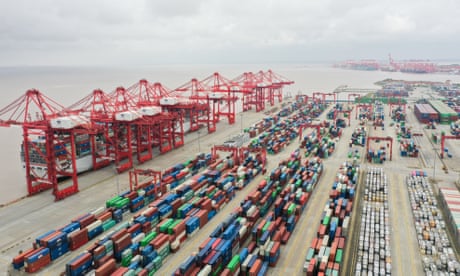- by foxnews
- 08 Apr 2025
Will China’s zero-Covid policy bring the world’s factory grinding to a halt?
Will China’s zero-Covid policy bring the world’s factory grinding to a halt?
- by theguardian
- 18 Apr 2022
- in technology

A top Huawei executive has broken ranks to warn that China's stringent zero-Covid policy may trigger "massive losses" for the tech industry, putting the country's economy as well as the global supply chain at greater risk.
"If Shanghai cannot resume production by May, all of the tech and industrial players who have supply chains in the area will come to a complete halt, especially the automotive industry," Richard Yu Chengdong, head of Huawei's consumer and auto division said in a WeChat post. "That will pose severe consequences and massive losses for the whole industry."
The comments from Huawei, a bastion of China's tech industry, underline growing tensions as the country attempts to eliminate Covid by locking down Shanghai. As lockdown continues in the key financial hub and home to the world's largest container port, economists have warned of heavy costs to both Asia's biggest economy and the global supply chain.
In recent days, Beijing has repeatedly reaffirmed its plan to handle Covid, which has been under heavy scrutiny as case numbers continue to rise in Shanghai despite a severe lockdown. In a news bulletin on state TV on Wednesday, President Xi Jinping urged his officials not to relax the pandemic control work.
But economists warned that the ongoing lockdown in Shanghai - if it persists for this month alone - will cost China's most populous city and a key financial hub a 6% loss of GDP, which translates to 2% loss of GDP for the whole of the nation.
This would, in turn, drag down by nearly 1% of China's economic growth aim to 4.6%, according to Iris Pang, chief economist for greater China at the Dutch bank ING. The premier, Li Keqiang, last month set China's annual growth target at "about 5.5%".
Last month, researchers at the Chinese University of Hong Kong said China's lockdowns were likely to cost at least �35bn a month, or 3.1% of GDP in lost economic output. The authors also estimated that imposing full-scale lockdown on a major city such as Beijing or Shanghai would reduce the national real GDP by 4%, of which 7% is contributed by the spillover effects.
Alicia Garcia-Herrero, Hong Kong-based chief economist for Asia Pacific at Natixis, said that 40% of China's GDP was already "in some form of lockdown". "GPS data shows that China is already halfway to the mobility lost during the first Covid outbreak in Hubei province in 2020. As of 12 April, monthly mobility in China fell by 29% versus 2019, with 24 provinces seeing a decline."
In February 2020, the reduction in mobility was 66%, collapsing in 29 provinces, Garcia-Herrero said. "The situation is particularly alarming for manufacturers in Shanghai, Jiangsu and Jilin - the key hubs for cars, electronics and semiconductors."
"We predict that for every month of lockdown in China, there'll be 0.5% of reduction in China's annual GDP," she warned. "Beijing claims it wants economic growth, but it's all about its priority after all - either to stamp out the virus or to allow the economy to grow. You cannot have both."
The lockdown has huge ramifications for the global economy, adding to strong inflationary pressures by choking off the supply of goods. Reports this week said almost 500 bulk cargo ships were moored off Shanghai, as the port struggles to handle them.
2022 is a crucial year for the ruling communist party. President Xi is expected to extend his rule during the 20th party congress later this year. ING anticipates that local governments as well as the central government in Beijing will top up their relief measures, increase fiscal support and ease monetary policy to help economic growth. The bank has revised China's GDP growth rate down to 4% year-on-year from 5% for the second quarter of this year.
The spillover effect of China's lockdown is also being felt in other parts of the global supply chain. Since Chinese cities such as Shanghai and Jilin entered lockdowns, shares of the car and semiconductor producers have been hit hard. "This will have an impact on consumers elsewhere," said Garcia-Herrero.
This week, Pegatron, a key iPhone maker, halted its operations at two subsidiaries in Shanghai and nearby Kunshan. The Taiwanese firm said it "actively cooperates with local authorities" and would try to resume operations as soon as possible. It followed the practice of Foxconn, another major supplier, which halted operations in the Chinese tech hub of Shenzhen in the southern Guangdong province in early March but later resumed "fundamental operations" later that month.
The woes in Shanghai have added another level of uncertainty into an industry that has been under pressure since the start of the Covid pandemic. "The global supply chain is so finely tuned that any disruption at a major trading hub such as Shanghai will have a major impact across the world," said Stephen Carr, commercial director at Peel Ports, one of the UK's biggest port operators.
"Whilst we are not currently seeing any direct impact at our ports, we are already handling enquiries from companies who are looking to use the port of Liverpool as an alternative to traditional southern ports in order to avoid any potential congestions further down the line."
The port shortages and disruption leave businesses facing a worrying scenario: running out of goods.
- by foxnews
- descember 09, 2016
Ancient settlement reveals remains of 1,800-year-old dog, baffling experts: 'Preserved quite well'
Archaeologists have recently unearthed the remarkably well-preserved remains of a dog from ancient Rome, shedding light on the widespread practice of ritual sacrifice in antiquity.
read more





